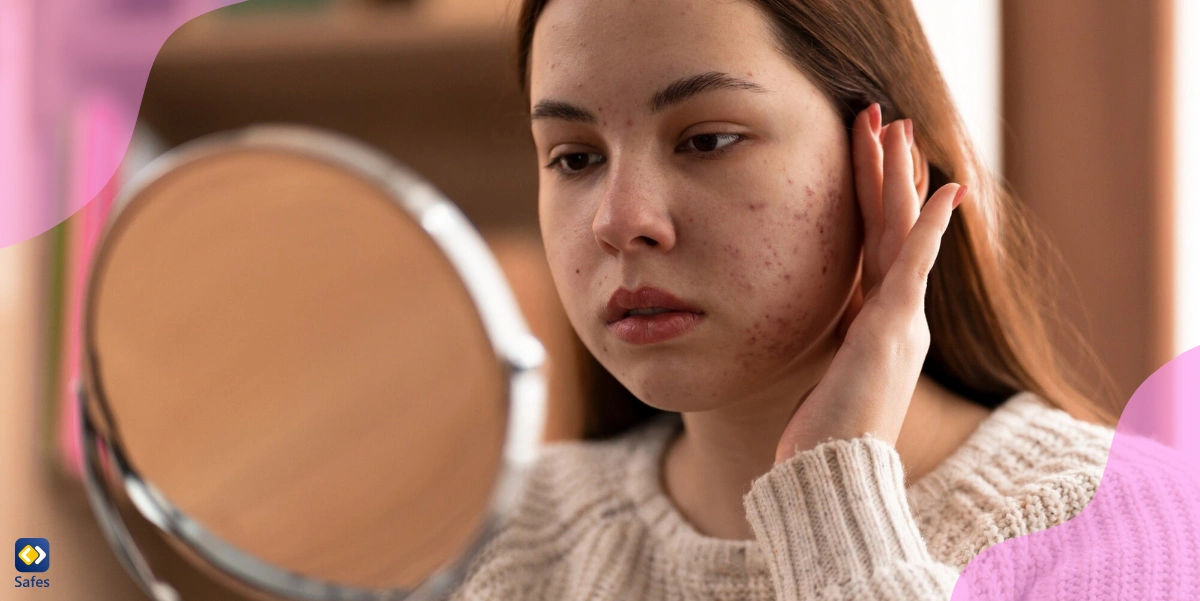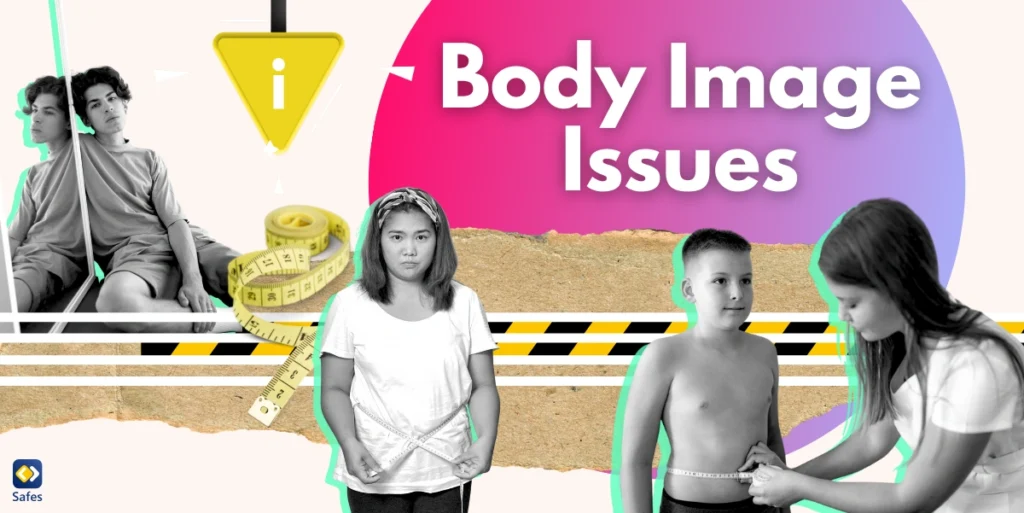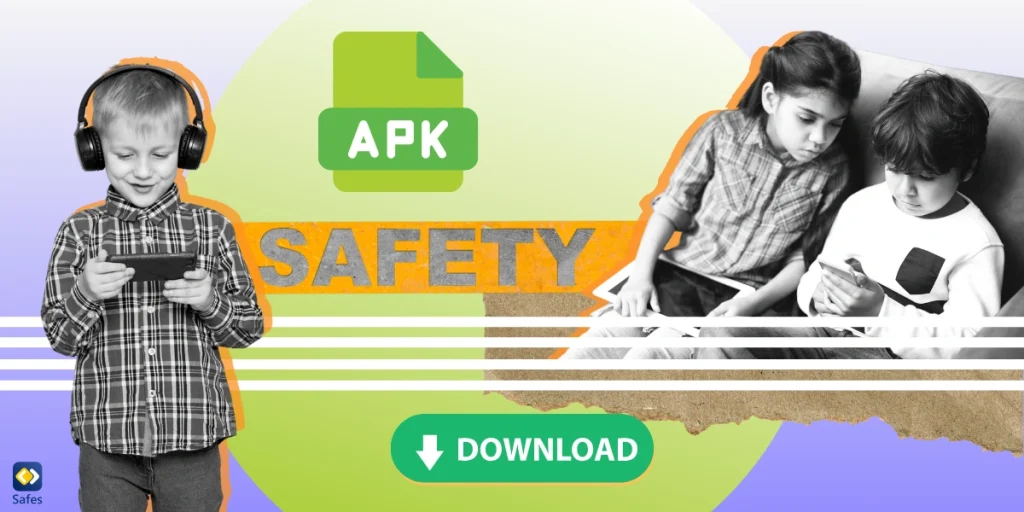Body image is how someone feels about their looks. Many kids feel unhappy with their bodies because of things they see online, at school, or in movies. These feelings can make them sad, less confident, or even lead to unhealthy habits.
Download and Start Your Free Trial of the Safes Parental Control App
As a parent, you can help your child feel good about themselves. You don’t need to be an expert to make a big difference. In this blog, we will talk about nine simple ways to learn how to help a child with body image issues. Each step can help your child see their beauty, inside and out, and build a stronger, healthier mindset.
What Are the Causes of Teenage Body Image Problems?
Before delving into adolescence and body image and learning how to promote positive body image in youth, you need to recognize the causes. Teenagers go through many changes in their bodies and minds. These changes can make them feel unsure about how they look. But other things can also cause body image problems, as described below.
- Social media and TV: Teenagers see perfect-looking people online, in movies, or on TV. These pictures and videos are often edited, but teens may believe they are real and get unrealistic expectations of their appearance, making them feel like they don’t look good enough.
- Peer pressure: Friends and classmates sometimes talk about looks or compare each other. If a teen feels they don’t match up, they might feel bad about themselves.
- Family influence: Sometimes, family members make comments about weight or looks. Parents causing body image issues need to be aware of their negative influence on their children’s self-perception and self-esteem.
- Bullying: Kids who are teased or bullied about their appearance often feel ashamed or upset.
- Changes during puberty: During puberty, the body changes a lot. Teens might not feel comfortable with these changes at first.

How to Help a Child with Body Image Issues at Home
Social media’s advantages regarding communication and gaining information aside, these platforms have potential consequences for youths. According to an article about body image, social media has a normative nature, meaning that it can easily form teenagers’ beliefs about everything, including their own appearance. Therefore, teens body insecurities are one of the biggest social media challenges. That’s why it’s important for parents to learn how to promote positive body image in youths. Here are nine effective ways that can help you with it.
1. Have Open and Honest Discussions with Them
Talking openly with your child is one of the best ways to help them. Let them know they can share their feelings with you without fear of being judged. Ask questions gently, like, “How do you feel about the way you look?” or “Has anyone said something about your body that upset you?” Listen carefully and reassure them that it’s okay to feel this way.
When they open up, focus on understanding their feelings instead of trying to fix them right away. Encourage them to describe what’s bothering them and remind them that everyone has insecurities. Being a safe person to talk to will help your child feel less alone in their struggles.
2. Be an Example of Positive Body Image at Home
Children learn a lot from their parents. If you speak kindly about your own body, your child will notice and follow your example. Avoid saying things like, “I need to lose weight,” or “I hate how I look in this outfit.” Instead, talk about the things you love about yourself, like being strong or healthy.
You can also teach them to appreciate what their body can do rather than just how it looks. For example, say, “I’m grateful my legs let me walk and run,” or “I love how my hands let me create things.” This positive attitude can help your child see their own body in a better way.
3. Limit Their Exposure to Unrealistic Media
As mentioned before, the media can create unrealistic ideas about how people should look. Therefore, you should teach your child that many photos or videos online are edited or filtered. Show them examples of how images can be changed to look perfect, and explain that real people don’t always look like that. You can also limit their screen time or encourage them to follow positive influencers who talk about self-acceptance. Spend time watching or reading things together that show diverse body types and celebrate different kinds of beauty.
4. Teach Your Child About Healthy Eating and Exercise
As we discussed so far, a negative body image is disruptive for teenagers. That said, it shouldn’t stop them from exercising and giving up on improving their appearance the way they feel good about it. Therefore, you should focus on teaching your child that being healthy is more important than being thin. Talk about how eating nutritious food and staying active can make them feel strong and happy. Avoid labeling foods as “good” or “bad,” but instead, encourage balance and variety in their meals. When they enjoy staying active, they’ll associate it with feeling good rather than a way to change their body.
5. Focus on Your Child’s Skills and Strengths, Not Appearance
It’s crucial to remind your child that their worth is not based on how they look. So, praise their talents, kindness, or sense of humor instead of their physical appearance. For example, say, “You’re so creative!” or “I’m proud of how hard you worked on that project.” Encourage them to explore hobbies and activities that make them feel good about themselves. This way, you can help them focus on what they can do, which will build their confidence.

6. Do Not Give Negative Comments About Weight or Appearance
Be careful with what you say about your child’s body or anyone else’s. Even lighthearted comments, like “You’re getting chubby,” can hurt their feelings and affect their self-esteem. Instead, use words that make them feel loved and valued for who they are. Also, avoid comparing them to others. If your child hears you comparing them to a sibling, friend, or celebrity, they may feel they’re not good enough. Remember to always celebrate their uniqueness and remind them that everyone is different.
7. Help Your Child Develop a Supportive Social Circle
No matter how hard you try to build a positive body image at home for your child, their belief about their appearance is sometimes clouded by their friends. That’s why it’s important to encourage your child to spend time with friends who make them feel good about themselves. Talk to them about how important it is to have friends who are kind and supportive, not people who tease or criticize them. Being part of a positive group can boost their confidence and make them feel accepted.
8. Address Bullying or Teasing Immediately
Whether online or in real life, our children are always exposed to bullying and negative comments. If your child is being teased or bullied about their appearance, TAKE IT SERIOUSLY! Talk to them about what’s happening and let them know it’s not their fault. Help them understand that bullies often act out because of their own problems. It also pays off to work with their school or other adults to stop the bullying. Helping them stand up for themselves in a healthy way can help them feel more in control.
9. Get Professional Help When Necessary
If your child’s body image issues are affecting their mental health, it’s okay to ask for help. A therapist or counselor can help them understand their feelings and build a more positive self-image. Look for professionals who specialize in working with children or teens. They can provide your child with tools to deal with their emotions and boost their confidence. Asking for help shows your child that it’s okay to rely on others when they need support.
Final Word
Helping your child build a positive body image is one of the most important things you can do as a parent. Throughout this article, we covered everything you need to know about teens and body image, teaching you how to deal with body image issues in children. At the same time, it’s important to create a safe environment where your child can grow without fear of online dangers or negative content. Safes is here to help. This parental control app helps you monitor and guide your child’s online activities to ensure they only access positive and healthy content. You can also manage screen time, block harmful apps or websites, and support your child in developing healthy digital habits. Safes offers more beneficial features to protect your child online than its alternatives, such as iPhone parental controls.
Download Safes today on Android and iOS, and enjoy our free trial to explore how it can help you create a safer and more supportive space for your child.
Your Child’s Online Safety Starts Here
Every parent today needs a solution to manage screen time and keep their child safe online.
Without the right tools, digital risks and excessive screen time can impact children's well-being. Safes helps parents set healthy boundaries, monitor activity, and protect kids from online dangers—all with an easy-to-use app.
Take control of your child’s digital world. Learn more about Safes or download the app to start your free trial today!




